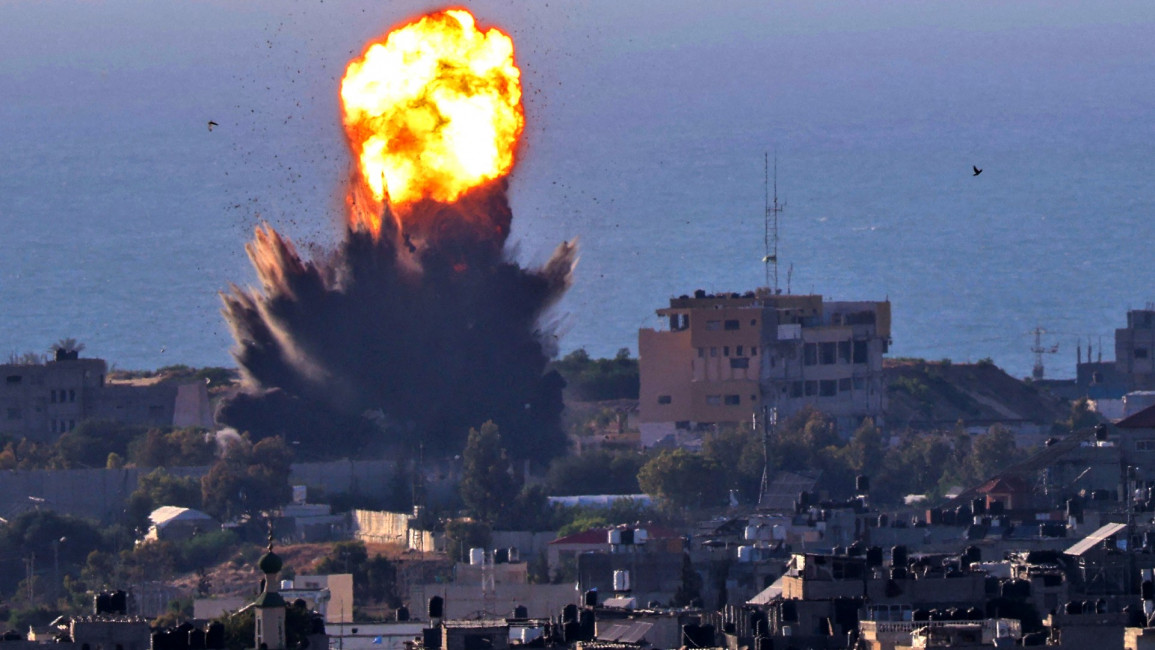Israel boosts troops on Gaza border amid escalating violence against Palestinians
Israel deployed additional troops to Gaza's border Thursday, and inside Israel deadly violence continued, which saw one Palestinian lynched by a far-right Israeli mob.
Army tanks shelled Gaza and AFP reporters saw troops assembling at the security barrier. But the armed forces maintained a ground offensive.
"We are prepared, and continue to prepare for various scenarios," army spokesman Jonathan Conricus said, describing a ground offensive as "one scenario".
With offensives against Gaza showing no signs of easing, Israel has been rocked by an unprecedented wave of violence, in which Palestinian families in Sheikh Jarrah are at risk of forced expulsions, prompting protests and Israeli forces to respond with violence.
Defence Minister Benny Gantz ordered a "massive reinforcement" to suppress the internal unrest.
Despite global condemnation of Israel's actions, and diplomatic efforts to de-escalate Gaza hostilities, which US President Joe Biden said he hoped would end "sooner than later", hundreds of rockets again tore through the skies.
The fourth day of heavy bombardments coincided with the start of Eid al-Fitr, which marks the end of the Muslim holy fasting month of Ramadan, and saw the faithful pray at mosques and amid the rubble of Gaza's collapsed buildings.
Israel's air force launched multiple air strikes, targeting locations it says were linked to Hamas.
In Gaza, 83 people were reported killed since Monday - including 17 children - and more than 480 people wounded as heavy bombardment has rocked the crowded coastal enclave and brought down entire civilian tower blocks.
Inside Israel, seven people have been killed since Monday, including one six-year-old, after a rocket reportedly struck a family home.
The Israeli military said it had hit targets in Gaza more than 600 times, while Hamas had fired over 1,600 rockets towards Israel.
'Preventing pogroms'
The military escalation was triggered by weekend violence at Jerusalem's Al-Aqsa mosque compound, after Israeli forces stormed the mosque during Friday prayers.
The disturbances, in which riot police had repeatedly assaulted Palestinians, has been driven by anger over the looming forced evictions of Palestinian families from the Sheikh Jarrah neighbourhood of east Jerusalem.
The surging tensions sparked assaults in many of Israel's mixed towns where Jews live alongside Arabs.
Nearly 1,000 border police were called in to quell the violence, and over 400 people were arrested.
Police spokesman Micky Rosenfeld said inter-communal violence was at a nadir not seen for decades, and that police were "literally preventing pogroms".
|
Prime Minister Benjamin Netanyahu said police were increasing their use of force, warning of the "option" of deploying soldiers in towns.
Hundreds were protesting in the central Arab town of Kafr Kassem and on Wednesday night, Israeli far-right groups took to the streets across the country, clashing with security forces and Arab Israelis.
Police said they had responded to violence in multiple towns, including Lod, Acre and Haifa.
Israeli television Wednesday aired footage of a far-right mob beating a man they considered an Arab until he lay unconscious on his back in a street in Bat Yam, near Tel Aviv. He was left with serious injuries.
Joanna Sassin, 45, surveyed the shattered glass outside her family's ice cream shop in Bat Yam, as she recalled the store being targeted by anti-Arab violence two decades ago.
She had hoped such hostility was confined to history but said, "sadly, I was mistaken".
A state of emergency has been declared with entry restrictions and a curfew in the mixed Jewish-Arab city of Lod, where an Arab resident was shot dead and a synagogue torched.
'Two-front battle'
Netanyahu said that "what has been happening these last few days in Israeli towns is unacceptable.
"Nothing justifies the lynching of Arabs by Jews, and nothing justifies the lynching of Jews by Arabs," he said, adding Israel was fighting a battle "on two fronts".
The UN Security Council has held two closed-door videoconferences since Monday, with close Israeli ally Washington opposing adoption of a joint declaration, arguing it would not "help de-escalate" the situation.
The UN said Israel's forced evictions could be considered a "war crime", and human rights groups are calling an end to Israel's violence.
Netanyahu spoke late Wednesday with Biden, who said "Israel has a right to defend itself".
On Thursday, Russian President Vladimir Putin spoke with UN chief Antonio Guterres, where Moscow said it was stated that the "primary task" was "to stop violent actions on both sides".
Amid the rocket fire, Israel's civil aviation authority said it had diverted all incoming passenger flights headed for Tel Aviv's Ben Gurion airport to Ramon airport in the south.
Hamas announced it had also fired a rocket at Ramon, in a bid to stop all air traffic to Israel.
Israeli media said the rocket missed its target, but a number of international airlines cancelled flights amid the aerial onslaught.
Hamas also said it had launched "suicide drones".
The Israeli army said it had downed one drone, while a spokeswoman for the Israeli regional council of Shaar HaNegev near Gaza said two explosive-laden drones had been located and disarmed, with no casualties or damage reported.
Follow us on Facebook, Twitter and Instagram to stay connected



